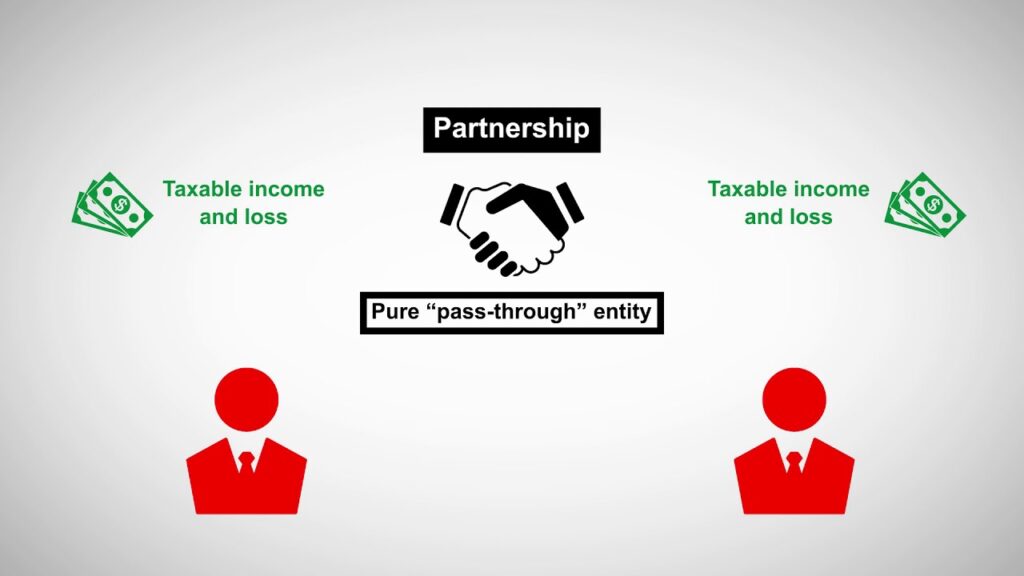Are you considering starting a business with a partner? It’s a great idea, but it can be difficult to do. That’s why we’re here to help you with the basics of partnership business tax.
Here are the questions we’ll answer about partnership business tax:
What is Partnership Business Tax?
Partnership business tax is a form of taxation that affects partnerships, limited liability companies (LLCs), and other pass-through entities. It’s important to understand how this tax works in order to report business income on your individual tax return accurately. The Internal Revenue Service (IRS) defines a partnership as “an association of two or more persons or entities who join together to carry on a trade or business.” A partnership must file an information return, Form 1065, to report the income, deductions, gains, losses, and other relevant information from the business operations. On this form, the partnership will calculate its own tax liability based on the reported income. This tax is known as the partnership business tax. The partners in a partnership are also responsible for reporting their share of income from the business on their individual tax returns. This income is referred to as “pass-through” income because it passes through the partnership and is reported on each partner’s individual tax return. Partners are subject to self-employment tax, Social Security, and Medicare taxes on the income they receive from the business. They must also pay their income taxes on this income. Therefore, understanding how partnership tax works are essential for both the partners and the partnership itself.
How Does Partnership Business Tax Work?
Partnership business tax is an important aspect of operating a business. It is important to understand the implications of partnership tax and how it works and to ensure that proper procedures are followed. Partnerships are considered pass-through entities, meaning that income and expenses are reported on the individual partner’s own tax return. This means that the partners do not pay taxes on their share of partnership income; rather, the partnership itself pays taxes at the end of the fiscal year. However, there are certain exceptions for certain types of partnerships, such as those based in certain states or those that operate as limited liability companies. Generally, all income from the partnership is subject to taxes, and the partners must file a tax return with the IRS. The tax rate will depend on the type of partnership and any applicable deductions. Additionally, partners may also be liable for specific state taxes, as well as self-employment taxes. Partnerships must also maintain records of all financial activity and file appropriate forms with the IRS. It is essential that everyone involved understand all the various aspects of partnership business tax and ensure that proper procedures are followed in order to remain compliant.
What Are the Benefits of Partnership Business Tax?
Partnership business tax is a type of taxation system specific to the organization of a business partnership. This unique tax structure offers many advantages over traditional business structures, such as sole proprietorships and corporations. For starters, partnership business tax provides pass-through taxation, meaning that the partners in the business are taxed on their individual share of the business’ profits. This means that the business itself does not pay income taxes; rather, it passes its profits or losses to its individual partners. Additionally, business tax allows for more flexibility in how income is allocated among the partners and how deductions are taken. This can be beneficial from a financial planning perspective. Furthermore, partnerships can offer more options for raising capital than other types of businesses. Finally, since partnerships have fewer government requirements than corporations, they are often more cost-effective to form and maintain. Partnership tax provides many benefits that can be advantageous to businesses of any size.

What Are the Challenges of Partnership Business Tax?
Partnership business tax can be a challenging task for businesses to manage. As with any form of taxation, there are a number of complexities and nuances that must be understood for the best results. One of the key challenges is understanding the different types of taxes that may be applicable to your business. This includes federal income tax, self-employment tax, and estimated taxes. Additionally, you must also be aware of any state or local taxes that may be applicable to your business. Another challenge is managing the taxation of individual partners in the business. Each partner may have different levels of income or deductions, which will need to be tracked and accounted for in the tax return. Finally, businesses must ensure that they are compliant with all relevant regulations and filing deadlines. Taking the time to understand all aspects of partnership business tax can help ensure that taxes are managed efficiently and accurately.
The main challenge of business tax is that it can be complicated and time-consuming to file and pay taxes. Additionally, there are many rules and regulations that must be followed, and it can be difficult to get assistance from the IRS if you need it.
How Do I Get Started with Partnership Business Tax?
Partnership business tax can be daunting to tackle, but it doesn’t have to be. To get started, you’ll need to understand the basics of partnership tax and ensure that you have all the necessary documents. To begin, you will need to register your business with the IRS and obtain an EIN or Employer Identification Number. Once you have this number, you can file a partnership return using Form 1065. This form will provide information about the income earned by the business and the deductions that can be taken. In addition, each partner must report their individual income on a Schedule K-1, which must also be filed with Form 1065. It is important to ensure that your partnership is properly classified and that all relevant tax forms are completed accurately. With the right guidance and preparation, you can ensure that you are paying the correct amount of taxes on your partnership business income and deductions.
Conclusion
Partnership business tax is a great way to save on taxes and get your money back from certain deductions and credits. However, it can be difficult to understand and navigate, so it’s important to have an accountant or legal professional like Ambition Accounting to help you get started and stay on track.

